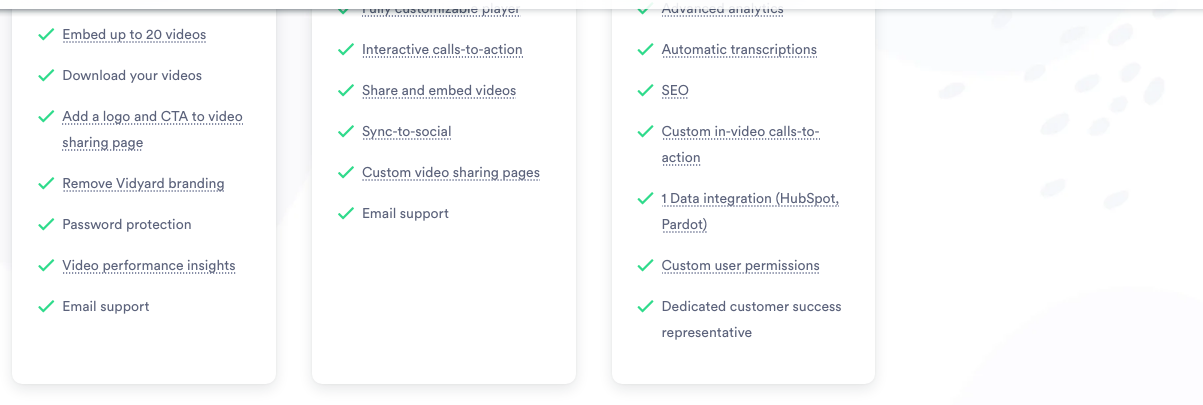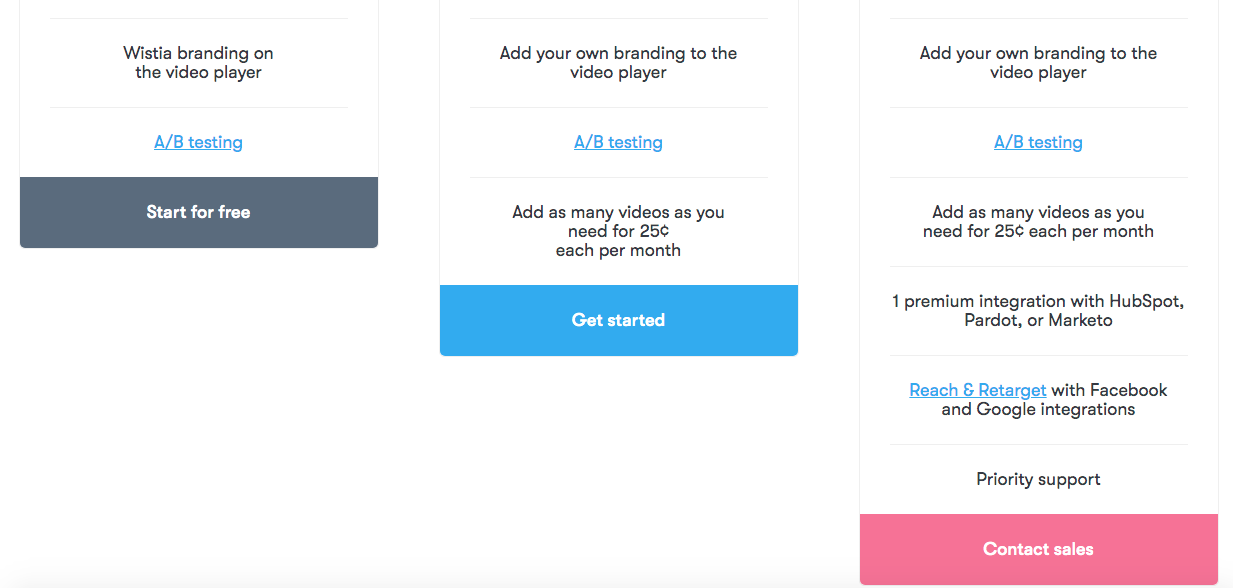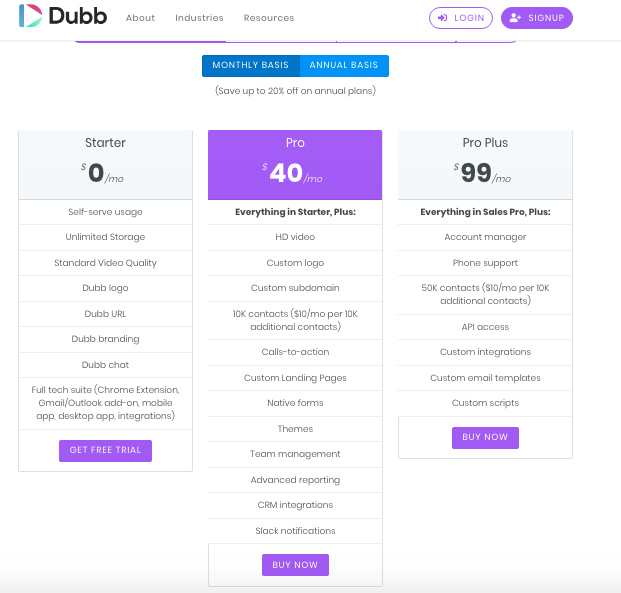How do you start video hosting for business?
For solopreneurs, entrepreneurs, small businesses and enterprises, that’s the million-dollar question, isn’t it?
The answer of which is simple:
You use a good video marketing platform.
But which video marketing platform is the best? Do a quick Google search and you’ll see a bevy of different video marketing services pop up—all advertising differing features, prices, and support structures.
So, how do you determine which of these platforms is the best for your business?
Well first, you have to take a hard look at the value you’re getting—and that comes from doing a close examination of the features and benefits you’re receiving for the price you’re paying.
Among the various platforms available that you can use to start video hosting for business, for this post we’ll be exploring the key differences between Dubb, Vidyard, and Wistia to help you decide which is the best video platform to go with.
So, let’s begin.
But first…
What Does Video Hosting for Business Mean for You?
Essentially, it means the ability to host your video content on a video marketing platform’s website instead of your own—and that’s a crucial element of any good video marketing platform.
Here’s why:
When you can take advantage of video hosting for your business, it means you won’t have to keep large video files on hand via physical storage (hard drives, etc.). It also means that you won’t be keeping size-heavy media assets on your website—which can inadvertently slow down your website, hurt your user’s online experience, and harm your on-page SEO.
A good example to look to is YouTube. YouTube is effectively a video hosting and video marketing platform all in one. Users who wish to record content via webcam, phone, or external camera can do so and upload as much content as they want directly to the video channel.
Instead, by uploading your content to a video-hosting platform, you can post your video content to a cloud-like online infrastructure and share the link to your content whenever you need to.
By using video hosting for your business, you’ll gain a ton of freedom in distributing your content—in addition to physical storage space.
Need to send an email with your video attached?
No problem.
Want to shoot over a quick text with a video?
Easily done.
Video hosting for businesses is absolutely essential attribute in modern video marketing, and is therefore a criteria that cannot be ignored by any prospective video marketing platform.
With that said, let’s take a look at Dubb, Vidyard, and Wistia to see how they stack up against each other.
To start, let’s take a look at the price of these platforms.
Pricing and Features
Vidyard


Wistia


Dubb

When determining value, the price will obviously play a major role.
From the chart above, you can see that Vidyard’s subscription plans offer several different tiers and prices based on the features and benefits they provide.
However, Vidyard and Wistia also offers free versions of their services, as well.

So, we’ll be starting here…
Note: Throughout this exercise, we’ll be comparing the value of each of Vidyard’s pricing plans to our own.
The Freemium Plan

Vidyard
It’s hard to beat free isn’t it? And it comes to free video hosting for your business, it’s a tall order to beat—especially when that plan is offered indefinitely (“Free Forever”). The lack of a credit card requirement just makes the deal even sweeter—ours does too, by the way—as well as the ability to upload and share as many videos as you want, and embed five to directly your website.
It seems like a hard deal to pass up, right?
However, we here at Dubb did a little digging into Vidyard’s “freemium” plan and discovered one important differentiator between our free version and theirs…
Their freemium version doesn’t offer analytics data.
For any reader unfamiliar with using video hosting for business marketing, not being able to pull direct analytics from your videos in this sense makes them almost useless.
Even YouTube—though not a business-focused video marketing platform—enables some degree of analytics tracking such as total views, cursory demographics information, and time spent watching the video.
This means that by choosing to host your video on a platform without this level of tracking would mean willfully missing out on basic analytics data—the same data you could get from a platform like YouTube.
Not to be too hard on Vidyard, but this makes the free version of the program largely a spectacle.
Wistia
To start, Wistia only offers “3 videos for hosting” whereas Dubb offers unlimited video sharing—which includes hosted “landing pages” where its users’ videos will live.
And that’s a big difference.
Again, it’s important to remember that Wistia is largely an embedding platform. That is, you create the videos, upload them to Wistia, and then use the platform’s tech to embed them on your domain to track the results.
In contrast, let’s take a look at Dubb…
Dubb
Like Vidyard and Wistia, Dubb lets you upload and share an unlimited amount of video content—the difference is that we also provide analytics information.
We should note that Dubb’s free plan is for a two-week trial. However, we can assure you that a two-week trial of analytics information you can actually track is much more useful than a lifetime of videos without any reporting whatsoever.
Next up…
The Mid-Tier Plan

Vidyard
Vidyard calls this plan their “Pro” plan. In truth, it’s an entry-level plan that grants users access to basic functions of their paid service for $15 a month. You also see a big jump here from five embedded videos to twenty, and finally, you gain access to video performance insights.
Admittedly, this is a good plan. It’s cheap and it offers good perks and benefits while removing any watermarked Vidyard branding.
But there’s one thing that’s still a problem…
Team management.
Unfortunately, this plan—even at its low price-point—is meant for individual users who want to continue to work as such. This means marketers and salespeople who wish to send a video message here or there but don’t expect much from any guidance or support.
Wistia
To start, Wistia’s “Pro” plan is more than double Dubb’s price point but let’s explore what you get for your monthly subscription.
You get to host 10 videos.
Instead, if you want to be successful at video marketing, you need a platform that encourages you to send a multitude of videos with the analytics to track what’s working so you can tweak and adjust your strategy as needed.
Dubb
Under Dubb’s initial “Pro” price plan, the management features offered are significant—this also includes HD video sharing and a 10K potential recipient list.
As you can see, these are big upgrades from the initial “freemium” plan.
Whether you’re a salesperson or a marketer, being able to send your personalized video messages to more than 10,000 prospects per month is a big deal—and it’s designed to be more than you’ll really need depending on your role and ambitions.
In conjunction with this mass messaging option, you’ll also get customizable marketing assets such as landing pages, URLs, and call-to-action options.
But most importantly, when it comes to ongoing management and support, you’ll have direct access to a specially-designated support channel filled to the brim with helpful videos to push you towards higher conversions.
Next up, we have Vidyard’s Pro-level subscription…
Pro-Class Tier

Vidyard
At $150 per month, Vidyard includes more features from its “Pro” plan, but in truth, they’re very similar to Dubb’s—namely its custom URL pages and custom CTA options.
In this case, the biggest difference here is price.
Dubb
At this level, Dubb is significantly cheaper in both form and features than Vidyard.
Moving on to the next tier…
Premiere Tier

Vidyard
Do a once-over of Vidyard’s $850 pricing plan then compare it to Dubb’s $100 plan. You’ll see very quickly that many of the features touted by Vidyard are nearly identical to Dubb’s premium plan—and at a fraction of the cost.
Wistia
There’s a BIG jump here in terms of hosted videos.
However, there’s one big flaw here.
Wistia’s pricing isn’t listed.
This tells you that the price is likely much higher than their mid-tier offering and they’d rather speak with prospective customers on the phone about it than to potentially blow the sale online.
And there’s an important insight to be derived from Wistia’s pricing information:
They’re likely aiming for big clients.
Whenever you see companies with top tier pricing like this left blank, it’s usually a clue as to which consumer demographic they’re trying to target. Which is totally fine…if you have a top-tier budget.
But if you’re a solopreneur, entrepreneur, small-business owner, or budget-conscious enterprise business, you likely want to avoid adding a bulky marketing expense to your budget—particularly if you’ve got a mindset to grow.
Dubb
Again, the jump from Dubb’s “Pro” plan ($40) to its “Pro Plus ($100) is sixty dollars. Compare that to the jump between Vidyard’s “Starter” subscription and its “Plus” package and you’ll see a significant increase.
To compare the benefits—other than the savings—it’s easy to see that with Dubb, you gain a more accessible plan that’s attainable, scalable, and allows for a variety of small and large-scale businesses with aims to grow.
Not only will you gain a bevy of customizable perks and benefits with Dubb, but they’ll also be packaged with all the advanced analytics options of the pro tier. You’ll also get additional support options that include direct access to a customer service representative—whether it’s day or night—along with a dedicated account manager for your team.
And bonus, your potential contact sends will jump up to 50K a month—a 40K increase from the pro plan.
With the Pro Plus level of Dubb’s premium service offerings, you’ll gain better service and more support, and you’ll get for fractions of the cost of Vidyard’s penultimate pricing plan.
And finally, the ultimate tier…
Enterprise Tier

Vidyard
At Vidyard’s final subscription level, you won’t find their pricing. Nor will you find any specialized perks or benefits. This may imply that given the size of the accounts for these plans, the service may be the same just with higher costs due to the additional human components of account management of that size.
Dubb
Dubb’s “enterprise” tier is simply our “Pro Plus” plan. What that means is that you’ll receive enterprise level account management, support, and functionality—all for $100 a month.
Integrations

When video hosting for business, integrations allow you to connect the video’s platform with other online applications. For example, one of Dubb’s integrations is Gmail, which means that Dubb allows you to upload and share videos directly through the application.
In the case of Vidyard, the application sports 34 integrations.
While Wistia only has 40.
Dubb, on the other hand, offers 84.
This level of added compatibility and support means more flexibility and freedom when utilizing your existing systems in conjunction with your video marketing platform.
So, when it comes to additional integrations, the more the merrier.
The Final Verdict
You had to see this one coming, but Dubb, of course.
After looking at the offerings and pricing of Vidyard and Wistia’s platforms, we believe Dubb is superior in a variety of ways, but most importantly in price and functionality.
For businesses looking to grow, but wish to do so without breaking the bank, Dubb offers enterprise-level capability at a fraction of the cost of other video marketing platforms.
To sign-up for a free two-week trial of our basic Dubb plan, click here.


